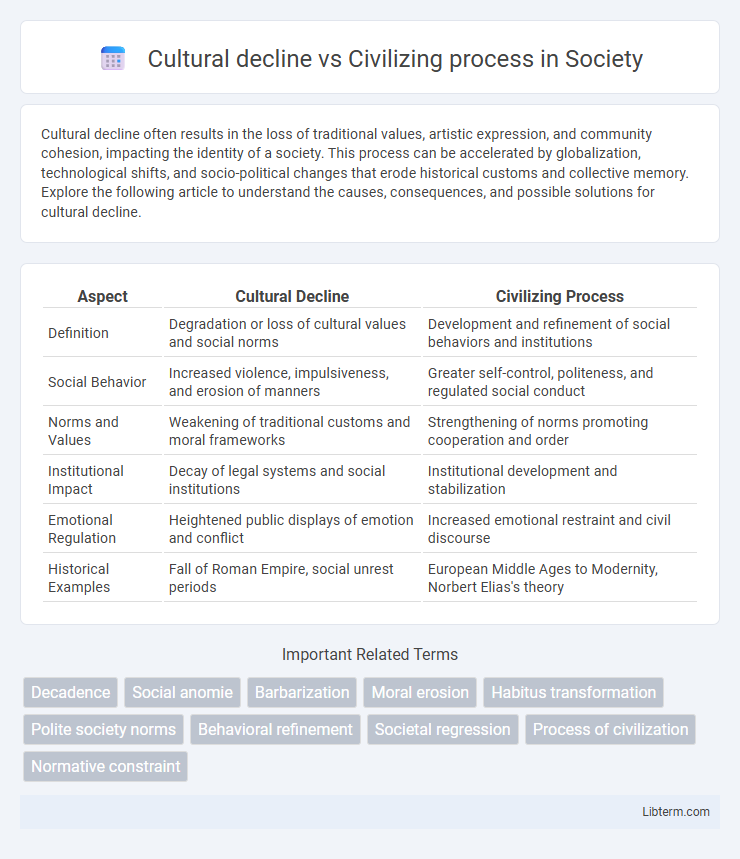Cultural decline often results in the loss of traditional values, artistic expression, and community cohesion, impacting the identity of a society. This process can be accelerated by globalization, technological shifts, and socio-political changes that erode historical customs and collective memory. Explore the following article to understand the causes, consequences, and possible solutions for cultural decline.
Table of Comparison
| Aspect | Cultural Decline | Civilizing Process |
|---|---|---|
| Definition | Degradation or loss of cultural values and social norms | Development and refinement of social behaviors and institutions |
| Social Behavior | Increased violence, impulsiveness, and erosion of manners | Greater self-control, politeness, and regulated social conduct |
| Norms and Values | Weakening of traditional customs and moral frameworks | Strengthening of norms promoting cooperation and order |
| Institutional Impact | Decay of legal systems and social institutions | Institutional development and stabilization |
| Emotional Regulation | Heightened public displays of emotion and conflict | Increased emotional restraint and civil discourse |
| Historical Examples | Fall of Roman Empire, social unrest periods | European Middle Ages to Modernity, Norbert Elias's theory |
Defining Cultural Decline and the Civilizing Process
Cultural decline refers to the perceived deterioration of societal values, norms, and behaviors that lead to a loss of cultural identity and cohesion. The civilizing process, as theorized by sociologist Norbert Elias, describes the gradual development of self-restraint, social etiquette, and complex social structures that enhance civilization over time. Defining cultural decline involves identifying markers of moral decay and social disintegration, while the civilizing process emphasizes increased social regulation and refinement of human conduct.
Historical Perspectives on Societal Change
Historical perspectives on societal change reveal contrasting views between cultural decline and the civilizing process. Cultural decline theories emphasize the deterioration of social norms and values over time, often linked to factors like moral decay and loss of tradition. In contrast, the civilizing process, as analyzed by sociologists like Norbert Elias, describes a long-term evolution toward increased social regulation, self-control, and refinement of behaviors within growing complex societies.
Key Theorists and Foundational Concepts
Norbert Elias's concept of the Civilizing Process outlines how societies evolve through increasing social restraints and self-regulation, enhancing cooperation and complex social norms over time. In contrast, theorists like Oswald Spengler argue cultural decline arises when civilizations face irreversible moral decay and loss of creative vitality, marking the end stages of cultural development. Key concepts include Elias' focus on habitus and social control, juxtaposed with Spengler's cyclical view of culture as an organic life form that rises and falls through distinct historical phases.
Markers of Cultural Decline in Modern Societies
Markers of cultural decline in modern societies often include the erosion of traditional values, widespread social fragmentation, and a decrease in communal participation. This deterioration contrasts with the civilizing process, which emphasizes increased social regulation, self-control, and the establishment of social norms that promote cooperation. Modern indicators such as rising individualism, moral relativism, and declining trust in institutions highlight tensions between cultural decay and ongoing civilizing dynamics.
The Evolutionary Nature of Civilization
Cultural decline and the civilizing process represent contrasting dynamics in the evolutionary nature of civilization, where cultural decline often signifies a regression in societal values, norms, and institutions. The civilizing process, as identified by sociologists like Norbert Elias, involves the gradual development of self-restraint, social cohesion, and complex social structures over time. This evolutionary transformation reflects how civilizations adapt through increased regulation of behavior and the cultivation of shared cultural capital, fostering long-term stability and progress.
Social Norms: Erosion or Refinement?
The debate between cultural decline and the civilizing process centers on whether changes in social norms represent erosion or refinement. Sociological research highlights that shifts in etiquette, manners, and social behaviors often reflect adaptive adjustments rather than a loss of societal cohesion. Longitudinal studies on social conduct suggest a nuanced evolution where certain traditional norms fade while new forms of politeness and cooperation emerge, indicating an ongoing civilizing process rather than outright cultural decay.
Art, Morality, and the Question of Progress
The debate between cultural decline and the civilizing process centers on shifts in art, morality, and societal progress, where art's transformation from classical harmony to avant-garde experimentation often sparks discussions about cultural decay versus evolution. Morality evolves through stricter social norms and self-regulation, illustrating Norbert Elias's concept of the civilizing process, which challenges the notion of inevitable decline by framing changes as complex developments rather than deterioration. Progress in this context is measured not by linear improvement or decay but by the dynamic interplay of cultural expressions and ethical frameworks that reflect deeper societal transformations.
The Role of Education in Cultural Development
Education serves as a pivotal mechanism in the civilizing process by transmitting societal norms, values, and knowledge that foster cultural cohesion and development. Cultural decline often correlates with a breakdown in educational systems, leading to diminished social capital and erosion of shared cultural frameworks. Effective education cultivates critical thinking and cultural awareness, reinforcing resilience against cultural stagnation and decline.
Globalization: Catalyst for Decline or Civilizing Agent?
Globalization acts as a powerful force influencing cultural dynamics by promoting cross-cultural exchanges, technological integration, and economic interdependence, which often catalyze a civilizing process through enhanced communication and shared values. However, it also poses a risk of cultural decline by accelerating homogenization, eroding traditional practices, and marginalizing local identities. The dual impact of globalization thus shapes whether societies experience cultural enrichment or cultural erosion in the modern era.
Future Trajectories: Decline, Progress, or Transformation?
Future trajectories of cultural decline and the civilizing process hinge on complex interactions between globalization, technological innovation, and sociopolitical dynamics. Cultural decline may manifest through erosion of traditional practices and collective identities, whereas progress involves enhanced intercultural dialogue and adaptive institutional frameworks fostering resilience. Transformation emerges as hybrid cultural models integrate modernity with heritage, suggesting cyclical patterns rather than linear progression.
Cultural decline Infographic

 libterm.com
libterm.com